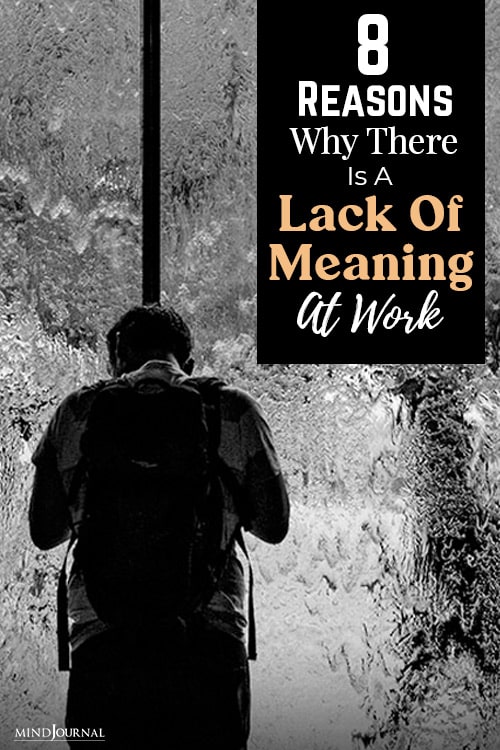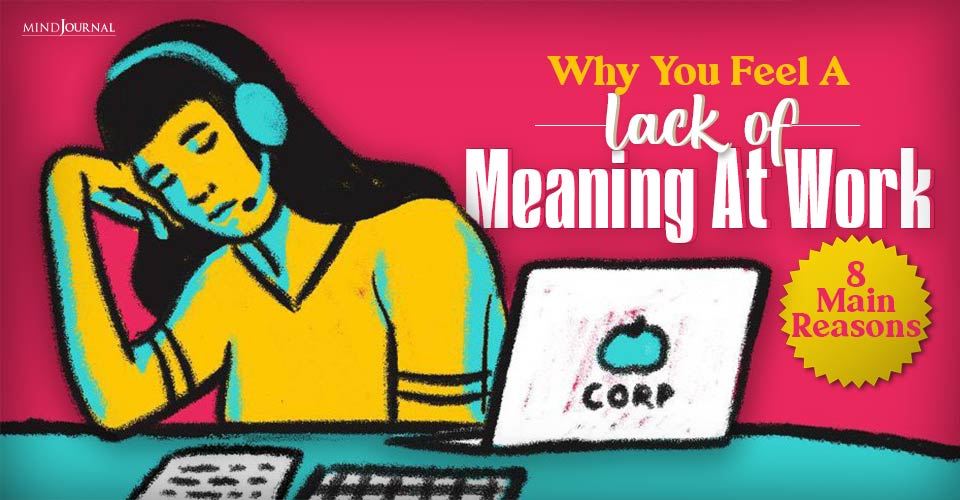Are you feeling a lack of motivation and commitment to do your job effectively? If you are unsatisfied with your work or unable to find meaning at work, refer to the causes behind the crisis of meaning in the workplace.
We often separate our work lives from our personal lives but, in reality, both are intertwined. Our work lives take our time and energy and often dictate where we live, how much we travel, and how much money we have. Frequently, we bring the conflict we have experienced at work home into our personal lives, and vice versa.
When we consider the amount of time we spend “at work” (both paid and unpaid such as volunteering), it should not be surprising that the search for meaning at work is—or at least should be—an important concern. Whether we run a company, drive a bus, clean a hotel room, or help the sick and homeless, our work is a reflection of the presence or absence of meaning in our lives.
I believe that there is a crisis of meaning at work. I’ve encountered many people who say they feel something is missing: they are stressed at work, unsure how they fit with the group’s or organization’s overall purpose, irritated by their co-workers’ lack of empathy and trust, and, overall, feel disconnected and not fully engaged. The root causes of this lack of meaning at work are varied.
Here are a few insights from our research, interviews, and experience at the Global Meaning Institute:
1. People may not know what they want in life
So they just put in time at their current jobs, taking the paycheck but not caring about the work, co-workers, or the organization.
2. They may be suffering
From exhaustion, dealing with issues in their personal lives, such as divorce, the excessive demands of childcare or caring for elders, or various health issues, leaving them with little energy to devote to and engage with their work. It leads to a crisis of meaning at work.
3. Younger workers face their own lack of meaning at work
Often exacerbated by the gap between their expectations and the reality they experience. They often suffer difficulties transitioning from school into the workplace and are overwhelmed by the demands that are placed on them. Working straight for eight hours is difficult for some who have limited attention spans given their upbringings in high stimuli, fast-paced environments.
Read What Is The Best Job For You? Take This Optical Illusion Quiz To Find Out
4. Lack of flexible work arrangements
The youth of today are attracted to more flexible work arrangements that provide the freedom to complete the work in the way they find most appealing. Some shun the traditional hierarchy found in many organizations.
They don’t want to work under the “command and control” rules that they feel are stifling and result in their loss of individualism. Younger workers have also complained to us that they want more access to their leaders and are disappointed when their leaders don’t ask for or listen to their ideas. his results in a lack of meaning at work.
5. Lack of respect
Older workers have complained to us that they resent the lack of respect they sense from others if they are not tech-savvy. They feel they don’t belong in the youth-oriented workplaces and miss the stability of the “way we used to do it around here.” Such a lack of respect leads to a crisis of meaning at work.

6. Lack of purpose in work
Many workers, both young and old, feel that the work is meaningless, lacking purpose. They have told us that there is too much focus on the financial status of the organization and not enough on the “human side of work.” Many are tired of the games, the conflict, and the bureaucracy.
Read Signs of A Toxic Person At Work : Workplace Bullying and Ways To Stop It
7. Lack of commitment
There is also a loss of meaning as the relationship between the organization and the worker becomes more tentative. Organizations, with the objective of lowering overhead costs and gaining more flexibility, are decreasing the number of full-time jobs and shifting the work to part-time or contract jobs, outsourcing jobs, or simply laying off workers and doing more with less.
Workers, in response, have less loyalty to one organization, choosing to focus on short-term engagements and then move on. It’s not surprising that there are lower levels of worker engagement under these scenarios. If an organization is less committed to its workers, then workers will be less committed to the organization. This gives rise to a crisis of meaning at work.
8. Emulating their leader’s behavior
Many people we’ve interviewed also questioned why they should be committed to leaders when these leaders seemed to be so focused on getting as much as they can get from the organization. Workers are told that the organization’s stock price is skyrocketing but, unfortunately, they don’t own any.
They see their leaders drive luxury cars into the company parking lot, reminding them of the inequality on a daily basis. Is it any wonder that some workers end up emulating their leader’s behavior, feeling like they deserve more and attempting to take as much as they can?
With more than half of the workforce not engaged, our workplaces are in trouble.
Read 3 Tips To Create Conversations That Are Worth Having In Your Workplace
This means that people are not working up to their potential, perhaps showing up for work, but exerting little effort, wasting time, slowing projects, and not really caring whether the organization is reaching its goals.
Some may sabotage innovation and improvement initiatives or even steal inventory, supplies, or money. They may even not show up for work, claiming fake illnesses or disabilities. All these actions affect the whole organization and further exacerbate the lack of meaning all-around.
It is important to first understand the causes of a problem before we discuss solutions. In a future article, I will explore solutions for addressing this crisis of meaning at work.
References
Excerpt and for further insights, please refer to Pattakos, A. and Dundon, E. (2017) Prisoners of Our Thoughts: Viktor Frankl’s Principles for Discovering Meaning in Life and Work, 3rd edition. Oakland, USA: Berrett-Koehler Publishers.
Written by: Elaine Dundon Originally appeared on - Psychology Today Republished with permission











Leave a Reply